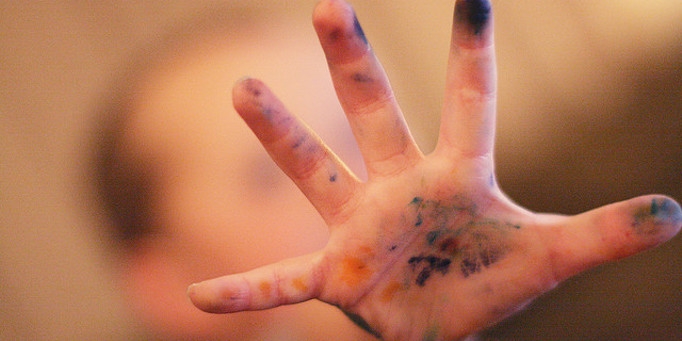
Parents, anger, and patterns for change
How do you deal with anger towards your kids? And what are you teaching them in your response?
I'm writing a book about anger. I know, lots of people think they could write the book on anger. But I'm not writing about just any anger. The kind no one talks about. Anger at our kids.
Those little angels we watch sleeping and think about how we would throw ourselves in front of a train for them if we had to?
Until the next day, when in the middle of ranting about why we do NOT use mummy's Blissful Golden Highlights hair kit all over the dog, that warm feeling flattens like Play Dough in carpet.
That kind of anger.
A common experience
We all feel it. No one is immune. Paul even warned us that we would get angry. “When you are angry, don’t let that anger make you sin, and don’t stay angry all day. Don't give the devil a chance.” (Ephesians 4:25-26, CEV).
Parents, the last thing we need is guilt added to our shoulders when the baby is screaming, the six-year-old is demanding the pink plate for dinner when you served her on the green one, and the toddler has escaped out the door naked. Again. Parenting is a tough gig.
But parenting with out-of-control anger is even tougher. That's why I want to share some helpful ideas I've learned from my own experience, and from speaking to hundreds of parents over the years.
Identify the patterns you learned for dealing with anger
Before kids, I had a very neat way of solving conflict. I avoided it. If a person looked like someone I wouldn't get along with, I stayed away from that person. Simple, yet effective.
Enter toddlerhood. Toddler doing something specifically designed to drive me right out of my mind. Maybe emptying the sunscreen bottle all over the carpet. Or having to go potty right after the car seat's buckled and you’re five minutes late for the doctor and you asked about that twice already.
Breaking news — I couldn't avoid my own kids! The trusty old system failed me!
They were standing there, dripping in sunscreen, and I had to deal with the conflict. But I didn't know how, because all my upbringing had taught me was that anger was wrong, conflict was to be avoided, and when all else failed, shame worked pretty well for making sure it didn't happen again.
Those were not good patterns.
How do you manage anger?
I don't know what patterns you learned for managing anger. Maybe the solution was to blame someone else or circumstances. (“If you hadn't spilled your juice again, I wouldn't have yelled ... if we had a bigger house, I wouldn't get so mad about the mess.”)
Maybe it was to let it all out and explode like Krakatoa. (No example necessary here, right?)
Perhaps you learned to stuff your anger down, pretending it didn't exist because “nice people don't have those feelings.”
Others of us learn to use shame and guilt as effective tools in the anger workshop. (“I am so disappointed in you.” “How could you do that to me?” "You've been a bad girl." "Stop acting like a baby!" "None of the other children are acting like you are.”)
What message are you sending your kids?
One of my most vivid negative memories is of the day my mother cleaned out my drawer and found some personal writing. I must've been pretty angry and written some nasty things about her.
I recall being made to sit in the brown rocking chair, turned toward the corner, for at least an hour. More importantly, I recall the message I received—your angry feelings are unacceptable and horribly wrong.
I never forgot that message—if you know what's good for you, hide your negative feelings. Be ashamed of even having them. Guess what message I passed on to my own kids?
Patterns are important, because we can't change our habits if we don't know what they are or why we follow them.
Anger is a habit. Feeling it is natural and normal, but the way we handle it becomes ingrained because of the habitual ways we learn to respond to those feelings. Going back to the root of those habits – where we learned how adults handle anger – helps us to see where those patterns may have been destructive to us and how we are passing them on.
Romans 12.2 suggests a remedy: “Don’t copy the behavior and customs of this world, but let God transform you into a new person by changing the way you think.”
Making changes
We don't have to let old patterns and habits command our future choices.
By turning to the power of God, we can actually change the way we think. As most of us know, changing the way we think leads to changing the way we act.
But we have to get our preferences and unwillingness to do the hard work of change out of the way, because notice the words here? “Let God transform you.” We have to admit Him into our deepest formed habits and ask for the change. Much as we might hate the way we act in anger sometimes, the old person is comfortable and easy. Becoming a new one is vulnerable, scary work.
The first step is asking God to reveal those patterns that need transforming.
Questions to ask yourself
- How did my mother/father act when she/he was angry? Were there words or phrases I remember still that affected me? What about a tone? (sarcasm is a popular one). How did they affect me?
- Was my parents' anger quiet and subtle or loud and explosive? How did I feel when it happened?
- Was I abused — mentally, emotionally, verbally, physically? Do I need help from someone else to overcome this? (There is no shame in that. At all.)
- Do I have to continue this pattern? What's one thing I can do today to start to change those habits?
Jill blogs at jillmarierichardson.com. Email jills-book@comcast.net to register your interest in her upcoming book .
For more articles from Growing Faith, subscribe to our monthly e-newsletter.
To hear about the latest books and resources from Youthworks Media, subscribe here.






